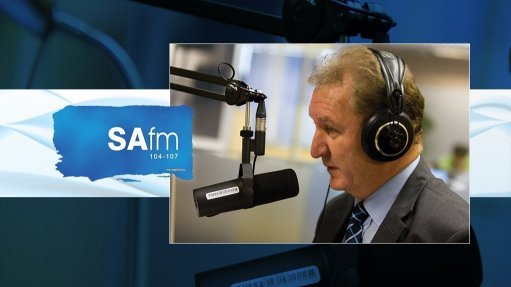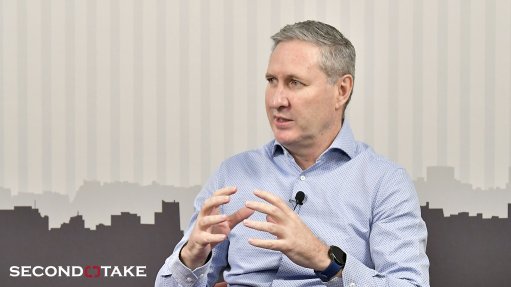Choosing a battery really is as simple as either caring about our planet or not
This article has been supplied by the author and has not been written or solicited by Creamer Media. It may be available only for a limited time on this website.
Lance Dickerson, MD at REVOV
Everyone is desperate, the president is considering a national state of disaster, we all want the lights on - but at what cost? That’s the question we should all be asking ourselves if we are to be honest and claim to care about our planet and our children’s future.
Take a moment and consider someone drowning in debt. It is an impossible, overwhelming feeling. Often, just to get some breathing space, the person will take a loan - perhaps from an unscrupulous credit provider or from a family member - just to make the immediate pain go away. However, as night follows day, that loan too eventually needs servicing. Was the few months of peace worth it?
We are in the same position in South Africa. We won’t beat around the bush: The national power grid is not under pressure, it is broken. Stage 8 load shedding - which none of us want - is not unimaginable any more. Households are at their wit’s end - food goes off, they can’t plan anything and appliances are being abused by constant power cuts. Small businesses are being taken to the cleaners, with many just not able to survive. Jobs are under threat, criminals eye nice dark houses with no electric gate or alarm power when the inferior lead batteries give in. It is a disaster.
And so, what happens? Those of us with the means say “enough is enough”, and we do whatever we can to reduce the burden on our businesses and households. “I’ll take whatever I can get my hands on,” is the prevailing attitude, a bit like the over-indebted person taking another loan and enjoying the short-term respite from creditor phone calls daily.
Let’s start with generators, pound for pound still the most affordable purchase price. Until now, most of the conversation has been around how much it takes to run them because of high fuel prices, meaning over the long-term, they cost more. However, if, like me, you’ve been unfortunate enough to see the massive diesel generators start at a large shopping mall, you’d have been sick to your stomach seeing thick, black plumes of smoke belch into our atmosphere, already struggling to provide enough clean air for us all because of Eskom’s over-reliance on dirty coal.
Then there’s batteries. You can’t blame people for choosing the cheapest option on the market. However, you can ask a question of the suppliers and distributors: why are you stocking not only inferior chemistry, but batteries that bring with them a heavy carbon price?
What is the point of buying solar panels or investing in big UPS and inverter systems, only to back them up with lead acid or gel batteries? First-life lithium batteries are a better option, but the mining and beneficiation of the raw materials puts massive strain on the environment. And so we are stuck with the same dilemma.
The energy transition to renewables does not come for free - it is dependent on minerals that need to be mined and then transported around the world and turned into usable renewable energy components and batteries. The electric vehicle (EV) market is competing for lithium iron phosphate batteries - the superior battery chemistry. And so, when we consider the stationary, or back-up energy market’s rapid growth, there is more competition than ever before. However in both these cases, the batteries come at a heavy cost to the environment. It is a glaring contradiction: to go green you must first hurt the environment.
Some cities, such as Shenzhen in China, are well on their way to sustainable e-mobility. These thousands upon thousands of EVs need to change their batteries every few years because in electric cars, there comes a point where weight versus output demands a battery change. However, within these batteries are perfectly good cells. These perfectly good cells are taken out and reconfigured and put into new casings with new components to become 2nd LiFe batteries. Equal to, if not superior in robustness, to first life lithium batteries. Were these batteries’ cells not reconfigured they would end up in landfills and - you guessed it – that would poison the planet some more.
About a year ago, while on the phone to two of the most experienced and senior battery consultants on the planet, both based in the US, I was astounded to hear from them that what 2nd LiFe companies such as ours do, is still “something new” to them. They agreed, immediately, that the carbon cost of a 2nd LiFe battery has already been paid for in the beneficiation and EV life, and that bar a small assembly line, they represent about the most carbon-neutral solution there is to renewable energy storage.
There you have it, clear as day. If you care about the environment and you want to “go green”, then there really is no reason to buy generators or lead acid batteries. First life is an option, but 2nd LiFe is the more environmentally responsible choice. It’s that simple. Sometimes people call 2nd LiFe second hand. It’s rubbish, as 2nd LiFe batteries are unrecognisable in their new configuration, like a BMW 320 being stripped and turned into a boat. But even if they were second hand, they still are the only real green solution.
It’s time to think long and hard about our actions. Are we making short-term investments that will keep the lights on now but end up contributing to a terrible planet for our children and their children, or are we consciously seeking out the legitimately green solutions that do the same thing? The environment matters. So do our choices.
Comments
Press Office
Announcements
What's On
Subscribe to improve your user experience...
Option 1 (equivalent of R125 a month):
Receive a weekly copy of Creamer Media's Engineering News & Mining Weekly magazine
(print copy for those in South Africa and e-magazine for those outside of South Africa)
Receive daily email newsletters
Access to full search results
Access archive of magazine back copies
Access to Projects in Progress
Access to ONE Research Report of your choice in PDF format
Option 2 (equivalent of R375 a month):
All benefits from Option 1
PLUS
Access to Creamer Media's Research Channel Africa for ALL Research Reports, in PDF format, on various industrial and mining sectors
including Electricity; Water; Energy Transition; Hydrogen; Roads, Rail and Ports; Coal; Gold; Platinum; Battery Metals; etc.
Already a subscriber?
Forgotten your password?
Receive weekly copy of Creamer Media's Engineering News & Mining Weekly magazine (print copy for those in South Africa and e-magazine for those outside of South Africa)
➕
Recieve daily email newsletters
➕
Access to full search results
➕
Access archive of magazine back copies
➕
Access to Projects in Progress
➕
Access to ONE Research Report of your choice in PDF format
RESEARCH CHANNEL AFRICA
R4500 (equivalent of R375 a month)
SUBSCRIBEAll benefits from Option 1
➕
Access to Creamer Media's Research Channel Africa for ALL Research Reports on various industrial and mining sectors, in PDF format, including on:
Electricity
➕
Water
➕
Energy Transition
➕
Hydrogen
➕
Roads, Rail and Ports
➕
Coal
➕
Gold
➕
Platinum
➕
Battery Metals
➕
etc.
Receive all benefits from Option 1 or Option 2 delivered to numerous people at your company
➕
Multiple User names and Passwords for simultaneous log-ins
➕
Intranet integration access to all in your organisation
















